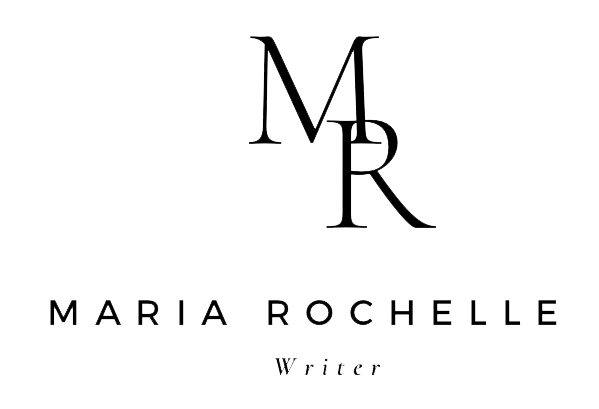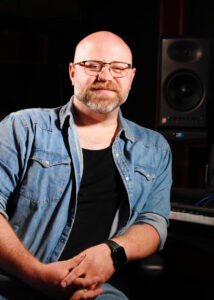
Welcome to my latest interview, it’s with Andrew Scott Bell, who is a film composer, and this will be my first with one. He’s scored music for Emmy award-winning and Academy Award nominee Ava DuVernay for one of her shows.
Millions of people have heard his music in over 2 dozen countries for one film he scored, which is the horror flick Winnie the Pooh: Blood and Honey. We talk about this film in our interview.
One film short, titled Rocket, won an Academy Award he wrote the music for. He has quite the resume, and he has accomplished more than I’m stating here.
He also received a commission to write music for an opera titled Trial of God, which is based on the same title written by Elie Wiesel, a Nobel Peace Prize winner and a Holocaust survivor.
He shares the joys and challenges of being a film composer and what he loves about his life.
Introducing Andrew…
What do you love about your life right now?
I feel very fortunate that I get to do what I love for a living. I am thankful I have a supportive spouse and a very loving pit bull. They both keep me centered in this ever-shifting and sometimes chaotic industry.
From what I’ve learned about you so far in my research for our interview, music has been part of your life since you were a child. You started playing piano and as you got older; you started writing pieces of music and then creating movies. Your way of storytelling is through your music. Was there any composer or a film that inspired you to compose music for films and TV shows?
Yes. Music, art, and storytelling have always been part of my life. One soundtrack in particular did light a spark in my creative brain. My parents had the two-disk soundtrack to Forrest Gump. Most of the tracks on the album were from rock and popular music from the time, but the final track on the second disc was a suite of orchestral selections from the film’s original score, composed by Alan Silvestri. I remember it ignited my brain, and I moved my stereo from my bedroom down to the upright piano so I could listen to the music over and over again and learn how to play it by ear.
I was going to ask you who your favorite composer is. But I found out on Instagram, and that’s Aaron Copland. What is about him and his talent as a composer that makes him your favorite?
Aaron Copland has had an incredible influence in my musical life, especially as I studied his works in depth in college. Something I really admire about him is the way he put his personal interests aside because he felt called to craft an orchestral style and sound for America. At the time, Germany, Russia, France, Italy, and other nations had defined themselves musically for centuries and therefore each had placed their influential stamp on western classical music. Aaron Copland decided America deserved its own signature sound, and he defined American music for more than a generation.
One reason I love films is because of the film score, especially the one from Braveheart and Henry V with Kenneth Branagh as Henry V. Your talent for composing music varies from horror, drama, animation, thriller, and family. I’m sure I left out a genre or two. I’ve listened to some of your music for the horror film Winnie- the -Pooh: Blood and Honey and then I listened to NBC’s Home Sweet Home main title music. I also listened to everything you have on your site. Your ability and talent are amazing. How do you compose for a film or a TV show? What’s the process?
Thank you so much. I appreciate your compliments and that you took the time to listen to my work. One of the things I love about this line of work is that every time I start another movie, it’s like starting a new job. There are obviously elements that remain the same or similar from movie to movie, but I get to start fresh with a new story and a new team of people on every project. I really like to let the movie sort of marinate within me for a few days before I start writing. By that point, I’ve already watched the film several times and had conversations with the director about tone and style. Then I can start the process of “warming up.” I think of composing music a lot like molding clay. The tools are often the same or similar, in terms of instrumentation, but once you start forming the clay, it can take a completely unique shape every time. Working is where the joy lies for me. The shaping. The crafting. It can be all-encompassing once I start, so I try to allow myself a moment to breathe and let the film sit with me before I dive in.
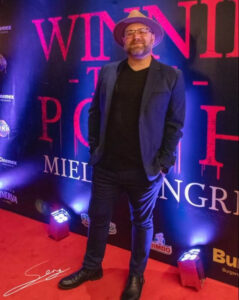
You worked with Ava DuVernay for the score for her show Home Sweet Home. How did you become involved with her show as the composer?
During the pandemic and well into 2021, I was heavily involved with a new, growing community of filmmakers using an app called Clubhouse. If Instagram is a social media app focused around photos and now videos, Clubhouse was / is a social media app centered around live audio conversations. It was like one giant conference call or live podcast with an audience. One day while I was working, someone sent me an invite to an ongoing Clubhouse conversation. The room was called “I’m looking for a composer.” When I entered the chat, it was Ava DuVernay. She was interviewing composers for her upcoming NBC show, Home Sweet Home. I was one of at least a hundred people she spoke to that night, but for some reason she kept me up on the stage (on the app there’s a stage of speakers and an audience who can only listen). Later in the conversation, Ava began to describe how a film composer differs from a music supervisor and she did so by telling the story of a scene and why a composer would write custom, emotional music specifically for that scene. As she was describing the scene, a mother coming home from a cancer diagnosis to find her daughter playing in the backyard – overcome with emotions watching these last moments of innocence before the news shatters their family’s life, I felt overcome with emotions myself. I unmuted my microphone and started playing the piano to the story, essentially live-scoring the scene. Ava loved that, and less than a week later, she hired me for her show.
Winnie-the-Pooh: Blood and Honey is a horror film score you wrote. When I heard there is a horror film with Winnie-the-Pooh as one of the leads who is a killer, I’m assuming, I thought, what is the world coming to? But, I admire the imagination of the writers and creators of the film who can think outside the box. I’m definitely going to watch it with all the lights on in my house. How did you learn about this film and become involved with it as the composer?
If you enjoy 80s slashers, I think you’ll enjoy both Pooh: Blood and Honey. It’s a fun homage to classic slasher films. I had so much fun working on the movie. I remember hearing about the film around town here in Los Angeles. There’s a saying that Hollywood is the largest small town in America, and I kind of think the LA horror community is the little biker bar on the outskirts of that town. We really all know each other, so when word of a strange, fun new horror movie starts making the rounds, it really travels fast within our community. I think my friend Ama told me about it first. I thought a slasher film based on Winnie-the-Pooh sounded like a total blast. So I went home and looked up the film on IMDb that night. I found the director on Instagram where he was already getting harassed by Pooh fans for “ruining their childhood.” He had screenshot one of those comments and posted it to his story, saying “My goal is to ruin the entire world’s childhood.” I responded to that by asking, “Can I help you accomplish that?” He must have really loved that because right away we started talking about musical ideas and it grew from there.
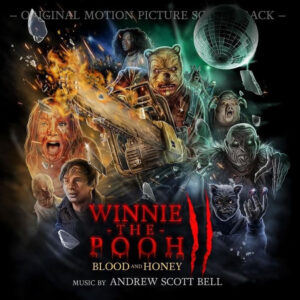
Winnie-the Pooh horror film has a sequel coming out. Did you also compose the music for it as well?
Yes, I did score the sequel too! Pooh 2 is a lot of fun – even more fun than the first one, I think. It’s available now on Amazon VOD for rent and purchase, and will be available for streaming on Peacock starting October 1st.
I imagine you love your work as a composer. Share with me the joys of being a composer and the challenges.
The joy of this work is truly in the collaboration and being part of bringing these films to life. Composers are some of the last creative team members to join a film. So we have a lot of creative catch-up to do which can be challenging, but it’s also kind of a benefit. We get to see the film with fresh eyes and I think that allows for some really exciting things to happen in a collaboration between me and the director, who has been living daily with this film for sometimes over a year.
I think the largest challenge I’ve found is the time and budgetary constraints. The deadline will not wait for me to feel inspired, and the money isn’t always there to fulfill my full creative vision. I’ve had to find creative ways over the years to almost coax or force inspiration rather than waiting for the spark of an idea to strike. I’ve also had to find dynamic and inventive ways to realize my vision for the scope of a film’s score under some extremely challenging budgetary limitations. For example, my vision for the first Winnie-the-Pooh: Blood and Honey film was to hire a choir to sing “sanguise et mel,” which is “blood and honey” in Latin. There was certainly no budget to hire a full choir for such a micro budget, independent film. So instead I recorded myself dozens of times singing all the parts and layered them together to create the sound of a full men’s chorus. When combined with the rest of the instruments I recorded, it creates the effect of a real choir.
There’s a saying that adversity breeds innovation. Often in my career so far, those challenges have resulted in the most rewarding experiences.
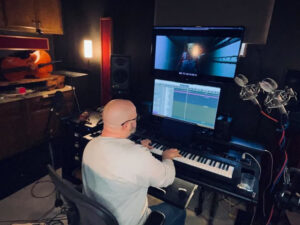
You received a commission to write an opera, The Trial of God, based on the 1979 play written by the late Elie Wiesel, who is a Nobel Peace Prize Winner and a survivor of the Holocaust. The opera debut in 2021. How different is it to write an opera versus a film score? Is it more challenging?
Writing an opera is a completely different art form and creative process than scoring a film. I had obviously studied operas for my bachelor’s in music composition and music theory, but I had never written one. It was extremely challenging and rewarding. I gave it everything I had, and it stretched me beyond what I thought I was capable of. It was truly the honor of a lifetime and a highlight of my career to write an opera based on such an incredible and moving story.
Elie Wiesel was not only an astonishing writer, he was a compassionate, caring, and considerate humanitarian. The impact he’s had on humanity is immeasurable. I feel so blessed to be a tiny part of telling that incredible story.
Do you have a favorite film or show that you wrote the score for?
It’s near impossible for me to pick a favorite film or show I’ve worked on, but I’ll take this opportunity to share some info about an upcoming film I scored that I’m really proud to be part of. TENANTS, which comes out on September 24th, is a really fun and heartwarming horror anthology. I’m delighted to have been part of it. The film has what I see as some of my finest work as a film composer so far. I’m immensely proud of that score and can’t wait to release the soundtrack. Stay tuned!
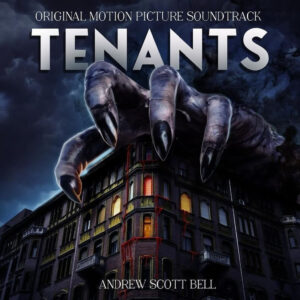
What are you currently working on?
Right now I’m about to start a really exciting film starring Gigi Saul Guerrero and Danny Glover called Grizzly Peak. I can’t wait to dive in and work with director Jason Ragosta.
Is there any advice you would give to someone who wants to pursue a career as a film composer?
I think the best advice I can give to someone wanting to pursue a career in film composing is to start by just watching a lot of films and writing a lot of music. Before you even start writing music for film, you should have a solid grasp and understanding of the craft of composition and how it fits inside a narrative structure. Then, once you’re at the point where you feel you can confidently write for a film, start with short films and practice your craft as much and as often as you can. Set your ego aside and learn to collaborate with others because film composition is a collaborative craft. Always remember your music is in service of the film and your work needs to align with the director’s vision for their film.
If you could have a gigantic billboard anywhere with anything on it, what message would you want to convey to millions? What would it say and why?
Wow. That’s an incredible question! I’m sure my answer will change every year as I think about this more and more. But for now, my answer is a simple message:
TELL SOMEONE YOU APPRECIATE THEM TODAY.
I strongly believe small acts of kindness can change the world in huge ways.
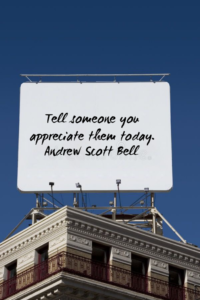
Who are your biggest supporters?
My biggest supporters are and always have been my family, especially as it continues to grow. My parents, my brother and his wife, their kids, my wife, and our amazing dog Honey. I’m so thankful to have a family that supports me and has always encouraged my creativity.
Describe yourself in one word.
I asked my wife for help with this question. She said, “jovial.”
This is one of my favorite parts of the interview, Andrew. Tell me three fun facts about you.
I once won tickets to a rock concert by licking my elbow on the radio.
I was the lead singer of the band Life’s Only Lesson. We were signed to Pacific Records in 2006. In 2010, we recorded our last album and eventually released it digitally on May 10, 2024. We are still the closest of friends and are currently producing a brand new album together just for fun.
I have an unhealthy appreciation of cheese.
I love ending the chat with a quote. Do you have a favorite quote or saying that has inspired and motivated you in your life that you can share with my readers?
“Life’s like a movie. Write your own ending. Keep believing. Keep pretending.” – Kermit the Frog.
Thank you for reading my interview with Andrew. If you would like to learn about him or want to follow him on social media, links are below.
